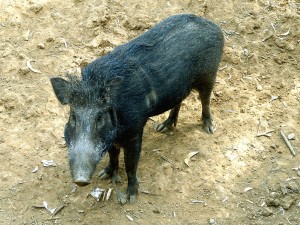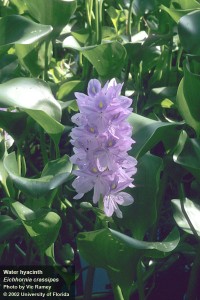National Invasive Species Awareness Week: March 3rd – March 8th
March 5th: Wild Hogs (Sus scrofa) & Water Hyacinth (Eichhornia crassipes):
Wild Hogs: Wild Hogs, also called Feral Hogs, are not native to the United States. Wild hogs are highly adaptable and can find suitable habitat easily. They are very prolific. Females have multiple litters of 3-8 piglets per year. Wild hogs are opportunistic omnivores that feed by rooting and grazing. The impact of wild hogs on the environment is soil erosion, decreased water quality, spread of other invasive plants, damage to agricultural crops, and damage to native plants and animals. Wild hogs pose a health risk to humans because they can carry numerous diseases and parasites. Human hunting is the most significant cause of mortality in wild hogs, although hunting alone will not eradicate hogs from a given habitat. The most effective way to remove wild hogs from a location is a combination of trapping and shooting. For more information on Wild Hogs, go to: http://edis.ifas.ufl.edu/uw322
For more information contact the author Jennifer Bearden, Agriculture Extension Agent, 850-689-5850.
Water Hyacinth: The water hyacinth is a floating non-native plant, which if left unchecked and allowed to grow to its maximum potential,
can weigh up to 200 tons per acre of water. Once it gets into rivers, it can choke out other vegetation and make navigation difficult if not impossible, because the plants will grow intertwined and form huge floating mats that can root on muddy surfaces. Water hyacinth is a wolf in sheep’s clothing—it is a highly ornamental plant. The plant will be several inches tall with showy lavender flowers and rounded, shiny, smooth leaves. These leaves are attached to spongy stalks that help keep the plants afloat. The prolific roots are dark and feathery. Although here in northwest Florida most of it dies back in the winter, it is able to regrow when the weather and water warm up. This weed can be controlled by physical removal, through biological control options—water hyacinth weevils will be useful in keeping the plant populations down—and by chemical means. For more information on hyacinth and other weed control in Florida ponds, please see the UF IFAS publication Weed Control in Florida Ponds. If you have any questions about identifying a pond weed, contact your friendly local county Extension agent.
For more information contact the author Libbie Johnson Agriculture Extension Agent, 850-475-5230.


